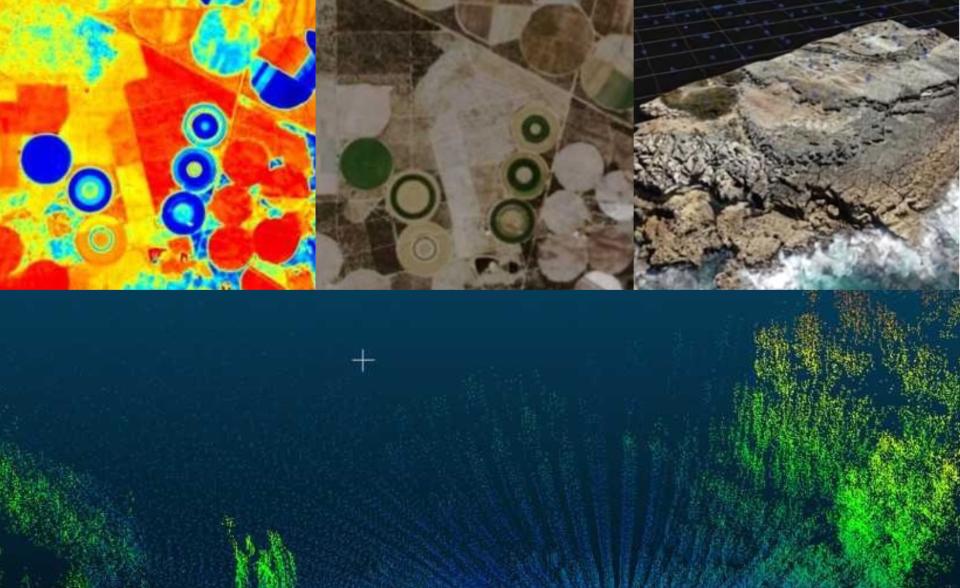-
Date:
From 27 Jan 2025 until 31 Jan 2025
-
Deadline for Applications:
20 Dec 2024
-
Location:
Room 2.3.37 - Building C2 - Faculdade de Ciências da Universidade de Lisboa, Campo Grande 1749-016 Lisboa
-
Duration:
36 hours (contact hours)
-
Schedule:
9h-12h30; 14h-17h30 Monday-Thursday; 9h-13h and 14h-18h Friday
-
Lecturer or Responsible:
Maria Alexandra Oliveira (CE3C-SystEco), Adriana Príncipe Silva (CE3C-ECOR), João Nuno Silva (INESC-ID/IST), Pedro Pinho (CE3C-urbanE), Inês Domingues (CE3C-ECOR, SystEco), Mariana Ramos (CE3CSystEco)
-
Department Responsible:
Departamento de Biologia Vegetal, Faculdade de Ciências da Universidade de Lisboa
-
Nº (min - max) Students:
10-20

Objectives
Remote sensing is becoming an invaluable tool extending data collection, both in space and time, to complement classical sampling strategies for both earth and biological sciences. This advanced course aims to provide access and tools to remote sensing data acquisition and processing for different applications using satellite, drone and terrestrial multispectral imagery and LiDAR, and focusing on characterizing the vegetation and landscape, and their changes in time.
Participants have to be present at 85% of the contact hours (this means that they can miss one half-day), and actively participate in all activities.
This course can give credits to PhD programmes at CIÊNCIAS or of programmes with partnership from CIÊNCIAS and other institutions with 6h-7h of contact hours per ECT, as a function of specific requirements. For these students additionally to the exercises done during the week the delivery of a written report done after the course is mandatory. For programmes with less hours of contact per ECT (6h/ECT, getting 6 ECTs from the course) students need to do an additional assignment (summary report). If needed 1 or 2 additional hours of contact may be added. Such report(s) are also advised for other students requesting creditation of the course in their institutions.
Minimal formation of students: Bachelor’s degree in Earth Sciences, Biology, Natural Science, or related areas. Basic programming skills (python/R) and knowledge on geospatial data processing.
Directed to: MSc or PhD students in Biology, Geology, Environmental Sciences, Ecology or related areas, postdocs and professionals working in related topics.
General Plan
Day 1
Theoretical introductions concerning remote sensing sensors (active and passive) and platform (satellite, drone, terrestrial). Data access platforms: available satellites and products, Remote Sensing data visualization using web portals, data download and visualization.
Day 2
Theoretical introduction and practical classes on programming using R and/or python to access, download and process remote sensing data.
Day 3
Morning: Use cases showcasing work involving CE3C researchers that used remote sensing data.
Afternoon: Practical session (eventually some field work nearby for data collection using terrestrial LiDAR, NDVI and multispectral cameras).
Day 4
Practical session for remote sensing data download and processing in areas of interest of the students (data is also available for students without study areas).
Day 5
Practical sessions and presentations from the students.
Funding
Students fees
Fee
Free for 1st year PhD students in Doctoral programmes at CIÊNCIAS (e.g. Biology, Geology), Biodiversity, Genetics and Evolution (BIODIV ULisboa; UPorto), Biology and Ecology of Global Changes (BEAG ULisboa, UAveiro) and Sustainability Science (ULisboa, several institutions), when the course counts credits for their formation, in which case the delivery of a final report done after the course is mandatory; the course is also free for more advanced PhD students of the BIODIV programme (ULisboa or UPorto); 50 € for more advanced PhD students of CE3C; 70 € for PhD students of the PEERS network (CFE); 125 € for CIÊNCIAS Master students and unemployed; 180 € for BTI, BI and other PhD students; 250 € for Professional and postdocs.
When the maximum number of students is reached, 10 vacancies will be available for non-paying 1st year PhD students mentioned above, being, by order of preference students from: 1) CE3C; 2) BIODIV (not from CE3C); 3) CIÊNCIAS (not from CE3C); 4) Sustainability Science (not from CE3C or CIÊNCIAS); 5) BEAG (not from CE3C or CIÊNCIAS).
Applications closed! Thanks for your interest.

